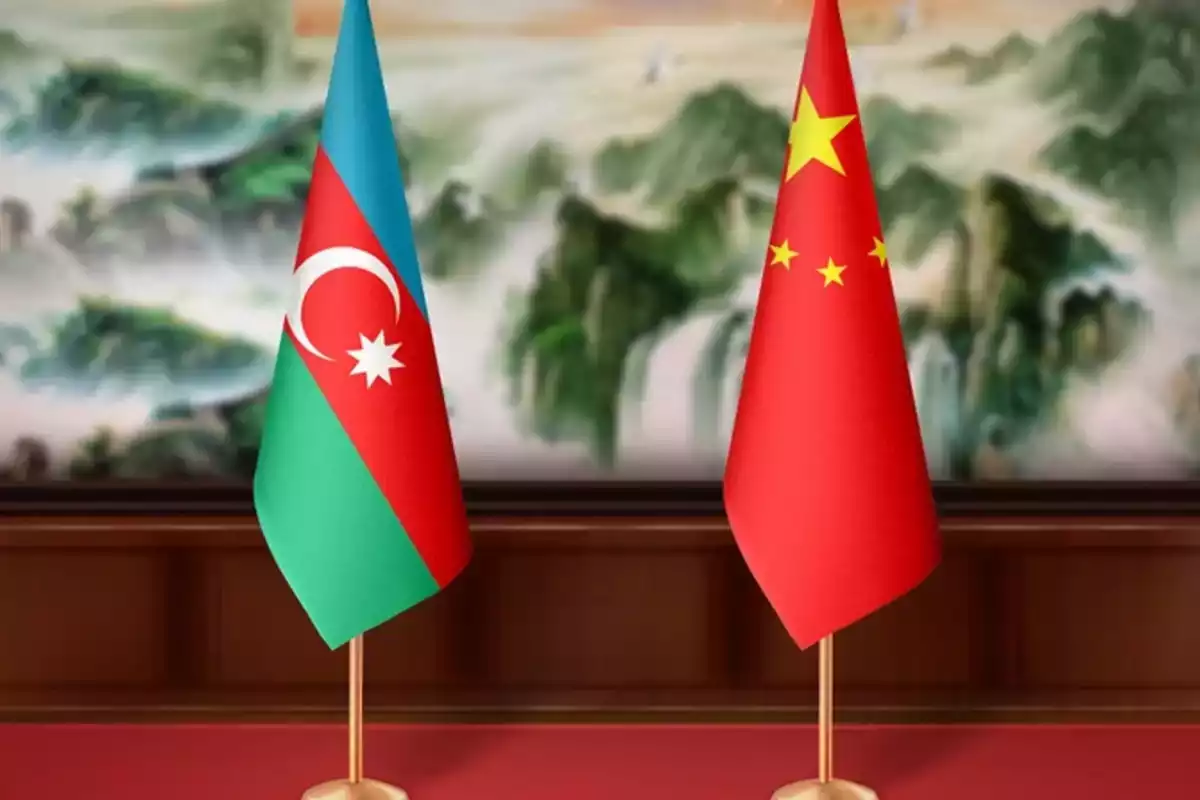
Photo: VCG
By Tural Heybatov
On April 23, during President Ilham Aliyev’s state visit to the People’s Republic of China, Azerbaijan and China took a significant step forward in their bilateral relationship by signing a Joint Statement on the Establishment of a Comprehensive Strategic Partnership. This milestone document solidifies the deepening alliance between the two nations. It follows the initial move made in July 2024, when the leaders signed a declaration on the sidelines of the SCO Summit in Astana, laying the groundwork for elevated cooperation.
The statement, signed by President Ilham Aliyev and President Xi Jinping, marks the conclusion of the foundational phase of bilateral engagement and the beginning of a more ambitious chapter. This new stage opens up far-reaching prospects for political, economic, and cultural cooperation.
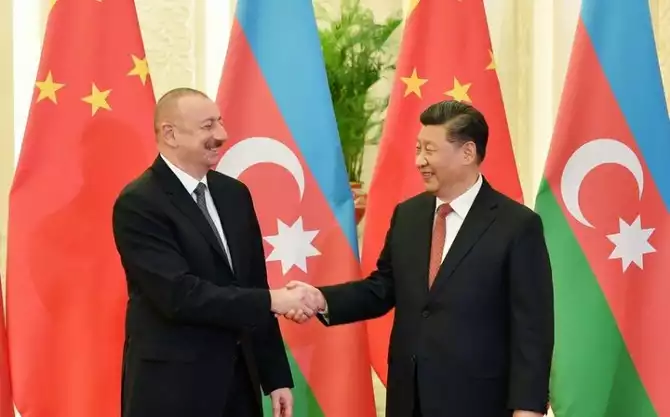
Source: AzerTAG
The summit was held in a warm, collegial atmosphere, underscoring the personal rapport between the two leaders. Xi Jinping has publicly referred to Ilham Aliyev as his “personal friend” on numerous occasions, an acknowledgment of the trust and mutual respect underpinning the bilateral relationship.
The Joint Statement includes 20 substantive clauses, reflecting concrete actions and initiatives rather than aspirational goals. These provisions align with the active and growing cooperation already underway across diverse sectors. President Aliyev’s visit has significantly accelerated the pace and depth of this collaboration.
On the political front, both countries reaffirmed core principles such as support for territorial integrity, adherence to international law, promotion of multipolarity, and the advancement of shared human values. President Xi described the need to jointly combat “the three evil forces”-terrorism, extremism, and separatism. Azerbaijan reaffirmed its support for China’s global initiatives and expressed its willingness to join the Group of Friends of the Global Development Initiative. For its part, Beijing pledged support for the Baku Process and Azerbaijan’s promotion of intercultural dialogue.
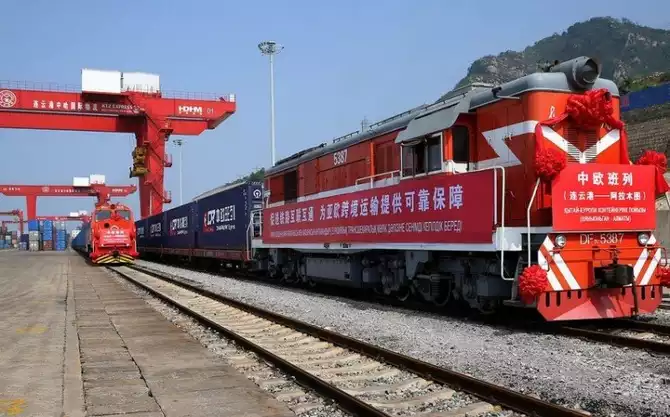
Source: Report
Transport connectivity remains a strategic priority. In an interview with Xinhua prior to his visit, President Aliyev emphasized Azerbaijan’s early and enthusiastic support for the Belt and Road Initiative (BRI). “After China, Azerbaijan is arguably the second-largest investor in the BRI, both domestically and abroad,” he noted. “At the Second Belt and Road Forum in 2019, I highlighted that the initiative fosters not just connectivity, but stronger ties between nations, meaningful dialogue, and new avenues for global trade.”
Azerbaijan’s leadership in logistics and infrastructure has further strengthened its role as a vital player in regional and transcontinental trade. Major projects such as the Baku-Tbilisi-Kars railway, the North-South Corridor, and the Trans-Caspian International Transport Route (Middle Corridor) are reshaping regional connectivity. President Aliyev singled out the Middle Corridor as the most reliable, secure, and cost-effective route linking China and Europe.
The Joint Statement affirms both countries’ intent to integrate China’s Belt and Road Initiative with Azerbaijan’s national strategy for the Revival of the Silk Road and the country’s 2030 Socio-Economic Development Strategy.
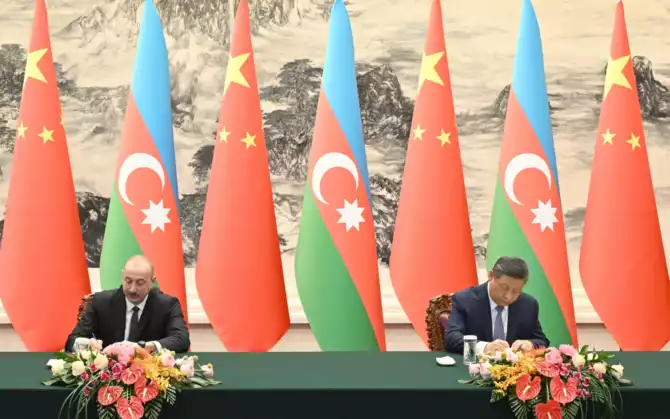
Photo credit: Azertac
Economic cooperation is expanding beyond transit infrastructure. A new Bilateral Working Group on Investment Cooperation has been formed to deepen ties in trade, green energy, and the digital economy. The two countries also announced plans to begin negotiations on a Free Trade Agreement.
These developments are expected to fuel further growth in trade. In the first two months of 2025, Azerbaijani exports to China reached nearly $11 million-five times more than during the same period the previous year. Meanwhile, imports of Chinese goods into Azerbaijan rose by more than 50%. The momentum is unmistakable.
China has expressed particular interest in increasing imports of Azerbaijani goods, including wine, pomegranates, poultry, hazelnuts, and almonds. Azerbaijan’s Trade Houses in Chinese cities such as Beijing, Nanjing, Xi’an, Qingdao, Chengdu, and Shaanxi are playing a key role in boosting visibility and access to Azerbaijani products.
Renewable energy cooperation has become a flagship component of the bilateral agenda. Both sides reaffirmed their commitment to advancing clean energy, promoting energy transition, and contributing to sustainable development. A series of major agreements were signed during President Aliyev’s visit, including:
An Investment Agreement for a 100 MW solar power plant in Gobustan between the Azerbaijani government and Universal Solar Azerbaijan LLC;
An Executive Agreement between Azerbaijan’s Ministry of Energy and China Energy Overseas Investment Co. Ltd. for an offshore wind power project;
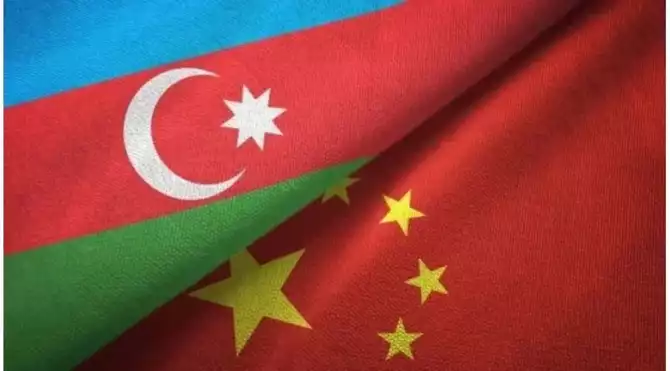
Source: AzerTAG
A Memorandum of Understanding among the Ministry of Energy, SOCAR Green, China Datang Overseas Investment Co. Ltd., and PowerChina Resources Limited for a 2 GW offshore wind farm in the Azerbaijani sector of the Caspian Sea.
These agreements build on earlier partnerships forged in the run-up to COP29, which will be hosted by Baku in November. Among them: a 160 MW solar power project in Azerbaijan’s Fuzuli District and various memoranda to facilitate R&D cooperation in renewables. With China at the forefront of green technology, Azerbaijan has chosen a partner that can drive innovation and long-term transformation in the energy sector.
Beyond energy and trade, the leaders agreed to deepen cooperation in education, cultural exchange, and science. Both countries will promote student exchanges, support Confucius Institutes in Azerbaijan, and encourage language instruction in both directions. Joint initiatives will also span healthcare, sports, cinema and television, youth engagement, and the media.
In this spirit, cultural diplomacy is emerging as a powerful tool. The two sides envision robust tourism growth, enriched cultural understanding, and intensified people-to-people ties. These ambitions are now bolstered by a pivotal agreement-the introduction of mutual visa-free travel for holders of ordinary passports. In July 2024, Azerbaijan had unilaterally lifted visa requirements for Chinese citizens for one year, resulting in more than a twofold increase in Chinese tourist arrivals. Now China has reciprocated. On April 23, in Beijing, both governments signed a formal agreement that eliminates visa requirements for ordinary passport holders. This move is expected to unleash a new wave of tourism, business travel, academic mobility, and cultural exchange. It also sends a clear political signal that Azerbaijan and China are not merely trading partners-they are building a strategic, multi-dimensional alliance grounded in openness, mutual trust, and long-term vision.
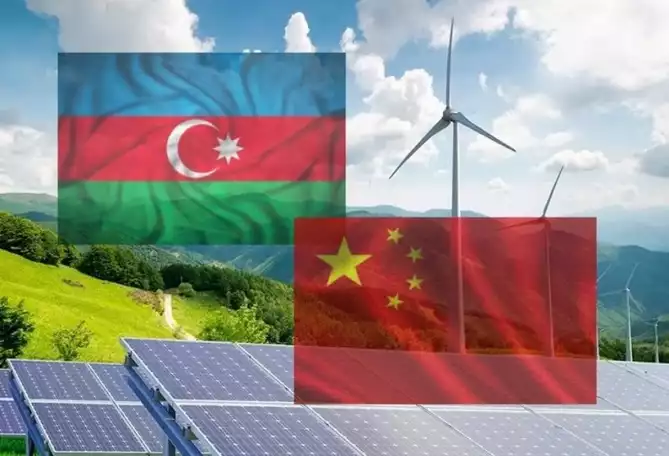
Source: Trend
Several other landmark agreements were also concluded-covering demining cooperation, legal assistance, technical and economic collaboration, science and technology, space exploration for peaceful purposes, and cultural and tourism exchange. A symbolic highlight: the twinning of Nakhchivan and Ürümqi as sister cities, further strengthening sub-national diplomacy.
What emerged in Beijing is not just a series of signed documents, but a compelling affirmation of strategic intent. Azerbaijan and China are entering a new era of partnership, one that aligns economic pragmatism with geopolitical foresight. The April 23 summit was not just about policy-it was about two nations choosing to walk together toward a shared future.
Share on social media